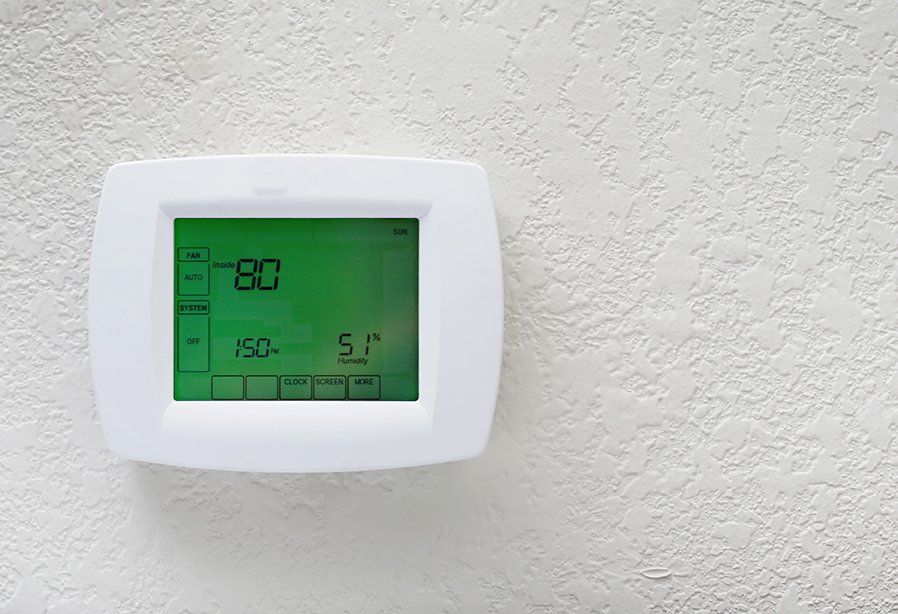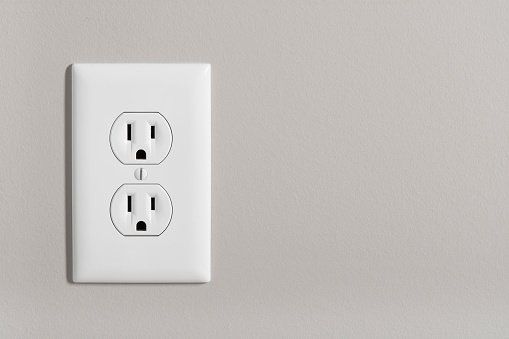How Outdated Wiring Poses a Hidden Fire Hazard to Your Business
- By Admin
- •
- 14 Dec, 2017
- •
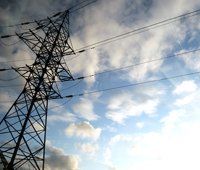
As a business owner, the wiring in your building likely doesn't cross your mind during day-to-day operations. It's out of sight, hidden behind your drywall, and as long as your electricity is working properly, you may think you have nothing to worry about.
However, if your business is in a building that was built more than 20 years ago, chances are it has outdated wiring that poses a fire hazard. This post explains why outdated wiring in the building your business calls home should concern you and why you should consider installing a new commercial wiring system.
Low Amp Wiring
Equipment that relies on electricity for power has made significant advances over the last two decades. As such, the power needs for modern businesses have changed dramatically. Unless the wiring in your building has received an update, it's likely to have a low amp commercial wiring system.
This system is designed to handle a lower electrical current than what today's commercial business equipment and electronics need. Using low amp wiring puts a strain on your electrical system because the building isn't designed to accommodate the required power.
Unfortunately, low amp wiring poses a fire hazard to modern businesses. When you use equipment that needs a higher current on an old system, it can cause the wires to overheat and spark a fire. Old wiring is a common cause of fires in office buildings.
Frayed and Damaged Wiring
The wiring in your building is essentially a highway of power carrying electrical currents from outlets to your main power hub. The wires that thread throughout your walls aren't indestructible.
The life span of a wiring system is about 30 years. Over time, the plastic, rubber or other material used to insulate your wires naturally deteriorates and becomes frayed and damaged.
When the wiring deteriorates, it leaves bits of live wire exposed. As many of us know, exposed wire creates a fire hazard. An aging system with worn-out insulation that leaves wires exposed is vulnerable to power surges, overheating, shorting out and encountering other elements in the wall that can cause a fire.
Aluminum Wiring
Aluminum was a common wire material for commercial buildings and residential homes some 30 years ago. It was substituted for copper during a shortage in the 1960s and 1970s. The aluminum of the time turned out to be a poor choice for wiring material. It corrodes much faster than copper and is associated with fire hazards.
While today's aluminum is safe and reliable, copper wiring is most often used in modern commercial buildings.
If you have aluminum wiring in your business' building, it's only a matter of time before you experience electrical issues. You should also know that most commercial insurance policies don't cover aluminum wiring-related fire damage since it's a known hazard.
Outdated Wiring Methods and Improper Modifications
If your business resides in a building built in 1970, or before, the builder likely used an outdated wiring method. Even if your insulation is intact and the wires carry enough current for your needs, your building could still pose a fire hazard in the form of outdated wiring methods. Standardized wiring methods from 40 years ago are considered obsolete and they pose a significant safety hazard.
Older wiring methods utilized suspended wires that run through studs and joists without a ground conductor. Instead of installing a new system, building owners of the past tended to modify this system to make it up-to-date. Unfortunately, improper modification of outdated wiring methods is another common cause of fires.
Outdated wiring poses a significant threat to your business. If you're considering replacing your outdated commercial electrical system, contact South Alabama Electric Co, for complete electrical services.
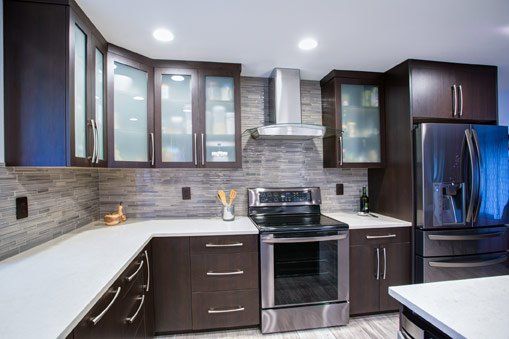
Modern-day appliances can make your life much easier, allowing you to prepare food and perform cleanup with much less labor. But it's important not to use these appliances thoughtlessly, or you can end up using (and paying for) more energy than you need. Use the following four tips in the kitchen to save money on your energy bills.
1. Turn Off Your Dishwasher's Heat Drying
Your dishwasher may have an on/off switch for the heat-drying setting. If so, keep this switched to off at all times to save energy. If your dishwasher doesn't have this switch, it may have an energy-saving cycle option that doesn't include heat drying. Or, if your dishwasher has none of these options, you may need to get a bit more creative.
First, time the cycle so that you know how long it takes to get through washing and rinsing. Then set a timer when you turn on each load, and turn the machine off when the timer is done counting down. This method will let you manually prevent your dishwasher from using the heat-dry cycle and allow your dishes to simply air dry instead.
2. Leave the Ice Maker off When Not in Use
Did you know that your built-in icemaker could be using about a fifth of your refrigerator's total energy draw? It depends on the model and the age of your refrigerator, but in many cases, turning the icemaker off can result in significant energy savings.
If you want to save the most possible energy, leave the icemaker off and use an ice cube tray to make your own ice. Or you can switch the icemaker on when you want ice, then switch it off afterward so it won't keep using up power 24/7.
3. Keep Appliances Maintained
Like your HVAC system and hot water heater, your kitchen appliances can receive a boost in energy efficiency and functionality when you keep them clean and in good order. The reverse is also true; run-down dishwashers and refrigerators waste energy and don't work as well. Here are a few ways to keep your kitchen appliances running optimally:
Keep your refrigerator and freezer at the correct temperatures so that they keep food safe but don't waste energy.
1. Turn Off Your Dishwasher's Heat Drying
Your dishwasher may have an on/off switch for the heat-drying setting. If so, keep this switched to off at all times to save energy. If your dishwasher doesn't have this switch, it may have an energy-saving cycle option that doesn't include heat drying. Or, if your dishwasher has none of these options, you may need to get a bit more creative.
First, time the cycle so that you know how long it takes to get through washing and rinsing. Then set a timer when you turn on each load, and turn the machine off when the timer is done counting down. This method will let you manually prevent your dishwasher from using the heat-dry cycle and allow your dishes to simply air dry instead.
2. Leave the Ice Maker off When Not in Use
Did you know that your built-in icemaker could be using about a fifth of your refrigerator's total energy draw? It depends on the model and the age of your refrigerator, but in many cases, turning the icemaker off can result in significant energy savings.
If you want to save the most possible energy, leave the icemaker off and use an ice cube tray to make your own ice. Or you can switch the icemaker on when you want ice, then switch it off afterward so it won't keep using up power 24/7.
3. Keep Appliances Maintained
Like your HVAC system and hot water heater, your kitchen appliances can receive a boost in energy efficiency and functionality when you keep them clean and in good order. The reverse is also true; run-down dishwashers and refrigerators waste energy and don't work as well. Here are a few ways to keep your kitchen appliances running optimally:
Keep your refrigerator and freezer at the correct temperatures so that they keep food safe but don't waste energy.
- Keep the fridge several inches away from the wall so that its coils get enough airflow to dissipate heat easily.
- Keep the fridge coils cleaned so they can work to their maximum potential.
- Keep your stovetop clean, especially under the burners (a shiny surface reflects heat back at the pan, increasing efficiency).
- Keep your dishwasher clean by running a cycle with dishwasher cleaner and no dishes.
- Keep the filter at the bottom of the dishwasher cleaned out.
- Keep your oven clean; blackened surfaces absorb heat rather than reflecting it back at the food.
These maintenance tips will help you keep your appliances running cleanly, smoothly, and efficiently for optimum energy savings.
4. Use Your Crockpot
Cooking a meal in a smaller appliance, such as a crockpot or toaster oven, can use less energy than firing up your family-sized kitchen oven. That doesn't mean you shouldn't use your oven, of course. But for small, simple meals, the crockpot may be a great fit. And if you're just making toasted cheese sandwiches, the toaster oven may work fine.
You can also reduce daytime heat gain in the summer by using your oven in the evening after temperatures have cooled down a bit. This tip works for the dishwasher as well. It may not seem like a big deal, but adding heat in the cooler evening can stress your AC system less (the more stressed the system is, the less efficient it becomes).
Use these five tips to make your cooking and dishwashing more energy-efficient and eco-friendly. Contact South Alabama Electric Co. for more information on energy-efficient kitchen use.
4. Use Your Crockpot
Cooking a meal in a smaller appliance, such as a crockpot or toaster oven, can use less energy than firing up your family-sized kitchen oven. That doesn't mean you shouldn't use your oven, of course. But for small, simple meals, the crockpot may be a great fit. And if you're just making toasted cheese sandwiches, the toaster oven may work fine.
You can also reduce daytime heat gain in the summer by using your oven in the evening after temperatures have cooled down a bit. This tip works for the dishwasher as well. It may not seem like a big deal, but adding heat in the cooler evening can stress your AC system less (the more stressed the system is, the less efficient it becomes).
Use these five tips to make your cooking and dishwashing more energy-efficient and eco-friendly. Contact South Alabama Electric Co. for more information on energy-efficient kitchen use.

Power outages are a year-round phenomenon in many parts of the US. Between snow and ice storms in the winter, and severe thunderstorms in the summer, our nation's power grid is constantly being put to the test. If your power goes does out, here are a few tips to help you through.
Things You Should Do
Report the Outage
When your power goes out, one of the first things you should do is determine if your neighbors have power. If they do, then the outage is localized to your home; if not, you're part of a larger outage.
If your house appears to be the only one affected, take a look at your electrical panel - it's possible that the main breaker became overloaded and tripped. If everything looks fine at the panel, you should report the outage to your electric utility right away.
If your neighbors are also out of power, you should still report the outage - don't make the mistake of assuming your neighbors have already called it in. Your electric company uses these reports to determine the scope of the outage, so the more reports, the better.
Unplug Sensitive Electronics
It's a good idea to unplug sensitive electronics after a power outage occurs. Things like computers, televisions, and microwaves can be damaged or even destroyed by a sudden power surge. It's also smart to invest in some high-quality surge protectors for these devices, as power surges can occur at any time.
Put Perishable Food on Ice
If it looks you'll be out of power for a while, you'll want to take steps to protect the food in your refrigerator and freezer. Pack your food into coolers with ice, or pack bags of ice directly into your fridge and freezer. If you have a meat thermometer, you can check food for spoilage before eating it.
Make It Fun for Your Kids
A power outage can be a great opportunity for some family bonding time. In this gadget-dominated era, it can be a relief to unplug for a bit and enjoy the company of loved ones. If you have young kids, grab some flashlights, make a blanket fort, and read stories. Why not create some new memories?
Things You Should Avoid Doing
Using a Generator Indoors
If you have a generator, leave it outside. Running a generator indoors exposes you and your family to deadly carbon monoxide, so don't risk it. You also shouldn't run it in an attached garage, as the fumes can still make their way into your home.
Burning Candles
A burning candle might create a pleasant ambiance, but if someone knocks it over, you're going to have bigger problems than a power outage. Stick with flashlights and portable battery-powered lanterns.
Opening the Refrigerator / Freezer
Keep your refrigerator and freezer closed as much as possible. There's a limited amount of cold air in there, and every time you open the door, you're letting a bunch of it out. So if you want your food to last, keep the doors shut.
Go Near Pooled Water or Power Lines
If your basement or crawlspace is flooded, stay out of the water. If the power goes back on while you're down there, it could electrify the water - and, by extension, you.
If you venture outdoors, you should also exercise caution. Stay far away from any downed power lines, as they often electrify whatever they come in contact with, including the ground.
Power outages aren't most people's idea of fun, but when life gives you lemons, make lemonade. By following these simple tips, you can keep yourself and your family safe - and create some new memories in the process.
For all of your electric needs, contact South Alabama Electric Co.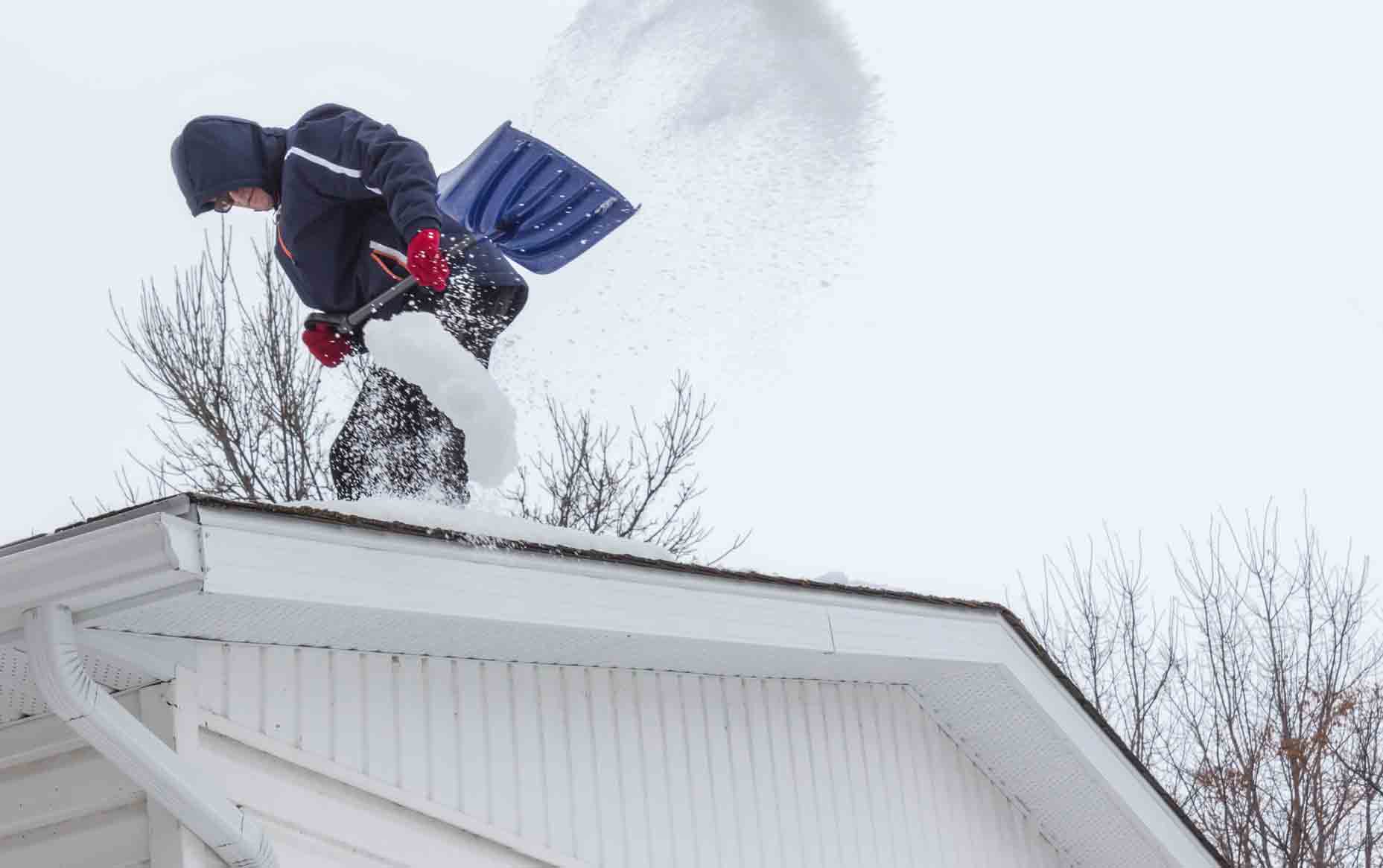
The particularly harsh winter weather has taken its toll on southern states that are not accustomed to such frigid temperatures. Some homeowners are considering how they can best keep their houses warm without breaking the bank with sky-high electric bills.
Fortunately, you can choose from several options that can save money while providing sufficient heating when the chill of winter settles on your home.
Insulation and Weatherproofing
The efficiency of your heating system doesn’t matter if the warm air in your home is able to escape while cold air enters through inadequate insulation and weatherproofing.
Insulation
If any of your interior walls feel cold to the touch, it’s likely because the insulation is not sufficient to prevent heat and cold transfer from the outside to the inside of your home. Although it will require an initial investment, installing insulation inside your walls will pay for itself over time in energy savings.
You may opt for standard fiberglass sheeting or have biological alternatives such as cellulose blown into your walls, which requires only small holes to be drilled from the exterior of the home for installation.
Your attic may also be a primary source of heat loss. Warm air is less dense than cooler air, so it rises to the highest area of the home. A poorly insulated attic will allow the heat to escape.
Insulation efficiency is defined through its R rating, so the higher the R rating, the better it will perform in keeping warm air inside your home.
Weatherproofing
Caulk around window and door frames, apply weather stripping to doors and windows, and seal around wall vents and other openings in exterior walls to keep the warm air inside your home and the cold air out.
Insulation and weatherproofing provide year-round savings for a maximum return on your energy efficiency costs.
Home Heating Components
You can save money while keeping warm through your choice of both whole home and room heating components.
High-Efficiency Heat Pumps
Your options have never been better when choosing a heat pump to heat and cool your home.
Heat pumps work by extracting heat from outdoor air and moving it inside the home in winter and removing heat from indoor air and transferring it outside during the heat of summer. According to the Department of Energy
, heat pumps can provide as much heating and cooling as conventional heating and cooling systems at a fourth of the cost.
In addition to heat pumps that transfer air, there are also those that use water for heating and cooling your home. Reverse cycle chiller heat pumps produce hot and cold water instead of air. The hot water can then be used for a radiant floor heating system.
A water-based radiant floor heating system consists of a series of pipes under the floors of a home. The pipes produce heat for the living space levels of the home. Radiant floor heating systems are more efficient than forced air systems in which heat quickly rises to the top of the rooms.
Portable Electric Heaters
You may find that your current heating system works just fine during moderate winter weather, especially if you need additional heating for only certain rooms in your home.
You can save money and still stay warm and cozy without turning up the thermostat by using a portable electric heater. However, not all portable heaters are created equal.
You should choose a heater that both produces and stores heat, such as an oil-filled radiator-style heater. The heating element heats the oil inside the radiator, which provides additional heat to the room when the power shuts off. Choose a model with a thermostat to produce the optimal temperature for your needs.
If you're in the South Alabama, Mississippi Coast, or Florida Panhandle areas, and you need electrical services, contact South Alabama Electric Co. for warm and friendly service.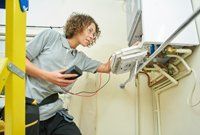
Energy efficiency is important for you, your home, your wallet and the planet too. If your electric bills are much more than you'd like to spend, taking a few steps to make your home more efficient can make a major difference. Don't worry, you don't have to spend a fortune updating your home with solar panels and a fancy new water heater just to beat the price of electricity.
You can increase your home's energy efficiency with a few pretty simple steps. After all, why spend your entire savings just to get back a few extra dollars? Okay, so it doesn't completely work that way. Even if you are spending just to save, you're doing more than keeping a larger part of your paycheck. You're saving the Earth and helping to reduce the impact that people have on it.
Whether you go big or start small, take a look at these easy ways to make your home more efficient and reduce energy use.
Keep the Outside Out
The sun shining through your living room windows provides plenty of gorgeous natural light. And yes, that may reduce your electric bill. Instead of turning on the overhead, you can sue what's shining in to keep things bright. But, if it's summer, that added heat from the sunlight is making your AC work harder than it needs to. That means it's using extra energy and raising your electric bill.
The same goes for the winter weather. If it's chilly outside and you have drafty, uninsulated, older windows, it's likely that you're losing heat. The more heat that flows out, the harder your furnace needs to work to keep your home comfortable. Again, your home is using energy it doesn't have to.
What can you do? In the summer use solar-blocking blinds or get UV-protective tinted glass to keep the rays from warming your home. In the winter, make sure that there are no gaps or cracks around your windows. When it comes to the windows themselves, choose newer, multi-pane glass that helps to insulate your home against the elements.
Speaking of insulation, make sure that everything (not just your windows) that leads to the outside is well-insulated. This includes your door frames, the attic, the basement and the garage spaces.
Turn It Off
You're in the dining room eating dinner. So why are the playroom, living room and bedroom lights on? If you aren't in the room, turn the lights off. The same goes for electronics, such as your computer, or other energy-zapping appliances. If you aren't planning on using an electronic device or appliance for a while, unplug it too.
How can this help your home (and the environment too)? Electronic devices and appliance use combined make up roughly 20% of most home's energy bills. Cutting down your overall usage obviously cuts down your bill.
You can also use an advanced power strip to cut down on how much energy your "plugged-in" appliances and devices are using up.
Improve Your Appliances
Older appliances use more electricity than you may think. Even if you turn them off when they're not in use, they still cost you money - and cost the environment as well. Before buying all new appliances, check a cost savings calculator (ENERGY STAR offers an easy to use cost savings calculator n their website) to find out if it's worth it.
Make Housekeeping Changes
You wash small loads of laundry on the full-sized setting and sometimes you forget about the roast in the oven and leave it there for way too long. You're using excess energy. Simple changes in the way you clean and cook can lower your energy bills. Make sure to fill the washer all the way up (both the clothes and dish washers) before doing a load. Avoid overly hot water when you wash your clothes, dishes or anything else. This makes you water heater work harder and can raise energy usage.
Are you looking for more ways to make your home energy efficient? South Alabama Electric Co.
can help.
Whether you're motivated purely by budgetary constraints or whether your focus includes living a green lifestyle as well as keeping your expenses down, saving money on your electric bill is a great place to start because it can do both. The less electricity you use this summer, the more you can reduce your environmental impact right along with your electricity bill.
Of course, living in the South in the summer can seem like a very difficult time to save energy because you may be running your AC unit nonstop just to stay cool, which can have a huge impact on your electric bill. But with a few savvy tips, you can save both money and energy this summer. Here are five ways to reduce your summer electric bill.
1. Check your insulation
The more insulation your home has, the less difficult it will be to keep it cool, which can save you money and energy. You should especially concentrate on the attic (to insulate the roof) and the windows, though; these areas tend to let in a high percentage of all unwanted heat. If your windows aren't very energy-efficient, consider adding an insulating window film.
In your attic, even if there's already enough insulation, you can lay down more if you like. You can also and add a radiant barrier to boost its effectiveness.
These are relatively small measures, but they can make a big difference.
2. Avoid adding extra heat
Summer is a great time to cook outdoors, especially because cooking indoors can make the room unbearably warm. If you do use your oven and stove a lot, try to do so when it's cooler, such as at night or in the early morning.
You can also wash your laundry in cold water, use a lower dryer setting (or hang clothes outside to dry), and replace your lightbulbs with more energy-efficient ones. All these strategies both reduce initial energy use and avoid adding extra heat to your home that you'd have to spend more energy extracting.
3. Create shade
Shading your home is another great way to help reduce heat gain so that you'll be more comfortable with less AC use. Whether you plant bushes or vines near windows to shade them, plant trees in strategic positions so they'll grow to shade the house without overhanging it, or install window shutters and shade sails, these tactics can help you save energy on your cooling for the summer.
4. Turn your water heater down
If you haven't already, it's a good idea to turn your water heater down to 120 degrees. This is generally hot enough for normal household use, and it's still cool enough not to burn as easily, which is why it's usually recommended to families who are childproofing their homes.
Luckily, it also means that your water heater won't be spending extra energy heating water to a higher temperature and then keeping it there all day waiting for you to use it.
5. Consider energy efficient appliances
Using appliances that are energy star certified is a great way to save energy year round. You won't want to go through and replace all your appliances right away, but if you have one you're planning to replace sometime soon, consider one of these energy efficient options.
These five tips will help you keep your household from expending unnecessary energy, adding extra heat to your home that you then have to use extra energy to expel, or letting too much heat in through walls and windows. If you'd like more tips on energy efficiency, instructions on turning your water heater's temperature down, or other energy-saving advice, feel free to call us today.
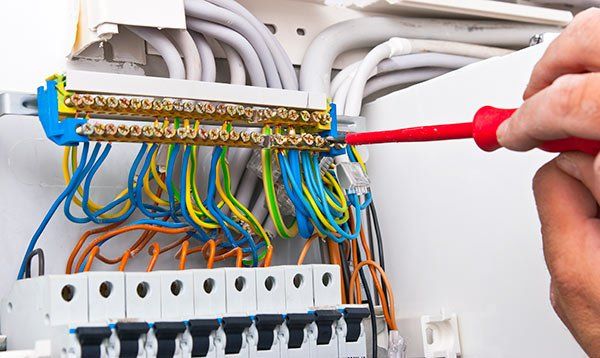
When it comes to running your business, faulty wiring and outdated electrical panels are probably further down on the list of issues to handle right away. As the old adage goes, “Out of sight, out of mind,” you might not be thinking about the old wires behind walls and breakers that could pose a threat to your business until they begin to short or cause damage to your electrical system. Here are three ways old wiring could cause a fire in your business.
Poorly Designed Electrical System
Depending on when the building was constructed, the wiring system could be outdated compared to the up-to-date electrical codes and standards of today. And if you need to have an inspection conducted, your electrical wiring might not pass.
Old Wires Behind Insulation
Whether older wiring was exposed by vermin chewing through the fascia or from a contractor nailing or drilling through the siding, old or bare wires can spark and insulation could catch afire.
Flawed Breakers
Old breakers and panels can also put your building at risk. If the switches or connected circuits are faulty, your electrical system might not work as it should.
Defective electrical wiring not only can delay the work process of your employees and reduce foot traffic to your business, but, moreover, can cause serious fires.
If your lights keep flickering or running too much power causes the electricity to go out, you might need to rewire your electrical system. Perhaps you need to install wiring in your newly constructed business and want a team of electricians that are professional and precise. You can contact South Alabama Electric Co.
for a free estimate today.

